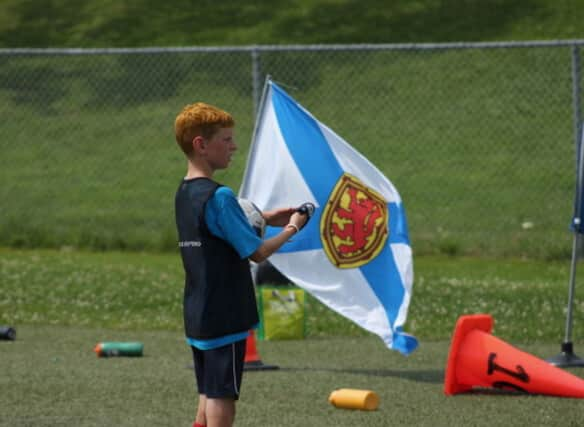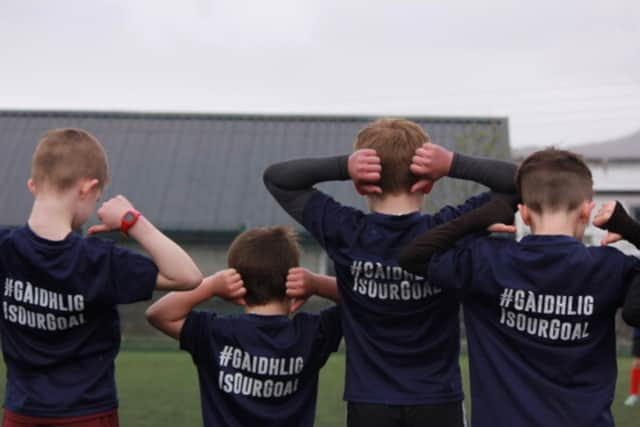The First Scottish Gaelic Football Service where players tackle narratives as well as opponents, FC Sonas


Scotland’s relationship to its heritage languages is odd but certainly not unique to the nation. Languages of the British Isles have become minoritised in their own heartlands and now, in the age of anglo-centricism, the uphill battle to counteract this mass erasure of native tongues is steeper than ever.
Often, when discussing our languages like Scots or Gaelic, a common dismissal from critics is that they are ‘dead’ languages that ‘don’t matter anymore’ - the former is categorically false and the latter at best falls to opinion. That said, for Scotland’s Celtic tongue (Gàidhlig), there have been encouraging signs in recent years that suggest a ‘renaissance’ in the making.
Advertisement
Hide AdAdvertisement
Hide AdFrom hit TV franchises like Outlander featuring Gaelic to over 1.5 million students signing up to learn the language on Duolingo plus famous Gaelic speakers such as Calum Maclean or ‘Caldamac’ being voted the ‘most influential Scot on TikTok’ last year, there is clear evidence that Gaelic does still matter to people.
This can also be seen in the creation of the first Scottish Gaelic football service; FC Sonas. What language is more universal than football? As FIFA explains: “There are five billion football fans around the world, with Latin America, the Middle East and Africa representing the largest fan bases.
“These fans will very often support their national team, their local club, a "world" club, and sometimes even a particular player.”
It is undoubtedly the most followed sport worldwide which proudly includes people from all walks of life and languages… Yet this representation has fallen short in Scotland. This was the observation of Calum Ferguson (seen below, right) who is a native Gaelic speaker from the Scottish Highlands and the brainchild of FC Sonas.
As a professional footballer himself who has played in places like New Zealand, Ferguson saw the attention rightfully given to the Māori language in the legendary Haka ritual etc. which led him to question Gaelic’s visibility in the Scottish football scene.
The idea was cemented while playing in Canada, however, where Ferguson encountered the Halifax Wanderers; a football club based in Nova Scotia who sport a Gaelic motto on their shirts. Following events in Scottish history like the Battle of Culloden which led to the Highland Clearances and mass emigration of Scots to Canada, this heritage is not lost on Nova Scotians and it is known that Gaelic was once the country’s third most spoken language.
The team pay homage to this legacy with the motto “Ar Cala, Ar Dachaigh, Ar n-Anam” which means “Our Harbour, Our Home, Our Soul” - a nod to the nautical heart of Nova Scotia; Halifax Harbour. Inspired by their example and driven by his own Scottish roots, Ferguson along with his friend Donnie Forbes created the first Gaelic football service during the 2020 lockdown with the intention of encouraging youths to exercise both physically and linguistically via their mother tongue.
This is the story of FC Sonas and their mission to wield the “unifying nature of football to tackle the narrative of Scotland’s native Gaelic language.”
What is FC Sonas?
Advertisement
Hide AdAdvertisement
Hide AdFC Sonas is a registered charity that serves as a Scottish Gaelic Football Service or “Seirbheis Ball-Coise Gàidhlig” in Gaelic.
In their own words, their mission statement is as follows: “Connect our community through the power of football where the linguistic spheres of the home, classroom, workplace and leisure, interconnect to optimise the benefits of bilingualism both on and off the field.
“Nurture the universal language of Football for the longevity of a healthy and growing Gaelic-speaking community.”
Describing the service’s vision, they write: “Rooted in strong foundations of Health and Wellbeing, vibrant grassroots can support the growth and journey of Gaels through the medium of football, forming pathways where sporting and language prowess are interdependent, to produce future leaders to guide the next generation and integrate social change for the benefit of all.”


Why is FC Sonas so named?
According to the LearnGaelic Dictionary, “sonas” refers to happiness or contentment. The word aptly reflects the football club’s intention to uplift Gaelic speakers via the sport.
The club’s motto “bruidhinn gàidhlig, cluich ball-coise” or “speak gaelic, play football” is a clever nod to the Celtic rock group Runrig (who recently lost their lead singer, Bruce Guthro, who was born in Nova Scotia.)
Just as their first album “Play Gaelic” encouraged music lovers to appreciate the language via song, FC Sonas does the same via football.
The Importance of Football
In their 2022 article, The Times explained: “It was in Canada and New Zealand that Calum Ferguson was inspired to create a national football team to represent the Scottish Gaels.
Advertisement
Hide AdAdvertisement
Hide Ad“The 27-year-old striker, who has been close friends with Ryan Christie since their childhood in Inverness, is now on a mission to forge opportunities for Gaelic speakers at all levels of the game in this country, having witnessed how other nations seek to cherish and maintain minority languages and cultures.”
However, the importance of football to FC Sonas runs deeper than its past and the inspiration behind its creation. The team explains on their website: “The importance of football to Scotland was revealed in The Scottish FA and UEFA-funded study ‘The Social Return On Investment from Football’.
“This report concluded that grassroots football provided £1.25 Billion of value to Scottish society, £200 million directly into the Scottish economy, £300 million worth of social benefits and £700 million worth of health benefits.
“These findings reveal the extent to which football is a force for good in supporting health and wellbeing, particularly following the impact of COVID-19 and the global health pandemic.
“To put these numbers into perspective, the Scottish Government commits £29 million in total for Gaelic annually.
“That is around 2.23% of the money that grassroots football injects into the Scottish economy.
“It is our commitment to harness this potential by developing grassroots and pathways for Gaelic speakers within the game.”
Forging strong Gaelic ties across the diaspora
The Football Language Programme “Play Gàidhlig” was developed by FC Sonas and the Halifax Wanderers in partnership to be the first ever Gaelic Language programme of its kind. With football holiday camps hosted in Sydney Cape Breton and Antigonish in Nova Scotia, it brought communities together to embrace their rich Gaelic roots.
Advertisement
Hide AdAdvertisement
Hide AdIn the past and to this day, the Gaelic language has suffered a lack of spaces where it can thrive (beyond classrooms) which has led to speakers using it only within their households which in turn damages their confidence.
This transatlantic partnership seeks to learn from this by celebrating the shared language roots of Scots and Nova Scotians and create new opportunities to empower their Gaelic development and forge ties with other Gaelic groups such as schools e.g., Taigh Sgoile na Drochaide which is a “new independent Gaelic immersion primary school in Mabou, Inverness County”.
In a statement to the Stornoway Gazette, Ferguson said: “In Canada, people had much more interest in Gaelic and the culture. They’d say – ‘you speak Gaelic, that is so cool’.”
When Gaelic students on Duolingo hit one million learners last year, it was noted that the majority were based in the United States. Clearly, the revitalisation of Gaelic has a strong case not only for the Scottish homeland but also North America broadly.
Comments
Want to join the conversation? Please or to comment on this article.
